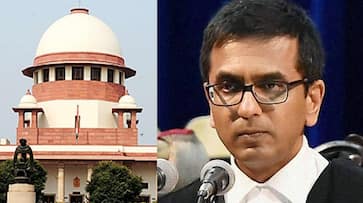While Justice DY Chandrachud has become the darling of the ilk of Prashant Bhushan today for the judge's voice echoing their sentiment on data privacy of Aadhaar, the advocate had wanted this very judge, along with a colleague of his, to recuse himself from hearing the Justice Loya death case
New Delhi: Justice DY Chandrachud established that the judiciary is beyond politics and vested interests. His judicial decision is being hailed as unbiased, as court verdicts should be, but those showering encomia on him held a not-so-charitable opinion about him not so long ago.
On Wednesday, Justice Chandrachud, part of the five-judge Constitution bench headed by Chief Justice Dipak Misra, chose not to go with the dominant view of giving sanctity to Aadhaar. He wrote a separate judgment expressing views different from that of the verdict pronounced by Justice AK Sikri.
Even as the Constitution bench observed that Aadhaar empowered — and gave identity to — marginalised sections of society, Justice Chandrachud differed.
Also read: Aadhaar judgment: Justice Ashok Bhushan concurs with majority verdict, says Act doesn’t create framework for surveillance
Justice Chandrachud's was the dissenting voice in the Supreme Court on Wednesday. He said Aadhaar violated informational privacy, self-determination and data protection. He further added that allowing private players' access to Aadhaar would lead to profiling, which could be used to ascertain even political views of citizens. This at a time when the majority view of the bench was to the contrary: "Minimal demographic and biometric data of citizens are collected by the UIDAI for Aadhaar enrolment. Aadhaar number given to a person is unique and can't go to any other person."
In a sense, Justice Chandrachud echoed the sentiments of many when he said the sheer assumption that every individual who opens bank account is a potential terrorist or money launderer is draconian. He went on to state, allowing private players to use Aadhaar will lead to profiling which could be used to ascertain political views of citizens. No wonder, he has become the darling of a section of society overnight, as he virtually spoke their minds.
Justice Chandrachud has punched innumerable holes in Aadhaar safety and agrees with Justice Sikri that section 57 which requires private parties to seek Aadhaar is unconstitutional. #AadhaarJudgment #AadhaarVerdict
— Abhishek Singhvi (@DrAMSinghvi) September 26, 2018
#AadhaarVerdict Private corporations cannot get Aadhar data. Passing Aadhar Act as money bill amounts to subterfuge. Thrilling to see constitutional values prevail! Salute, Justice Chandrachud!
— Shoma Chaudhury (@ShomaChaudhury) September 26, 2018
Justice Chandrachud basting the speaker of the LokSabha . Says power cannot be unbridled !!! He says role of Rajya Sabha cannot be limited . He says #Aadhaar
— Tehseen Poonawalla (@tehseenp) September 26, 2018
Cannot be regarded as a money bill #AadhaarVerdict
'Aadhaar Act is Unconstitutional': The Fiery Dissent of Justice D. Y. Chandrachud
— nikhil wagle (@waglenikhil) September 26, 2018
https://t.co/s1wSP85w3X
But it wasn’t so until recently. More or less the same people who are cheering him had launched a campaign of slander against him. His fault? He was hearing the case of the death of Judge Loya. Senior advocate Prashant Bhushan, who was among those who wanted the case to be re-opened, had argued that two of the judges of the Bench — Judge AM Khanwilkar and Justice DY Chandrachud — have been judges of the Bombay High Court, and since there was a chance of them knowing the judicial officers who have submitted the statements, it was important for them to recuse themselves from hearing the case.
What transpired inside that courtroom had huge political ramification, the insinuations against Justice Chandrachud were tantamount to defamation, if not contempt.
In a curt reply, Justice Chandrachud, who was made to look like a villain then by the same people who are celebrating him today, said, “A decision as to whether a judge should hear a case is a matter of conscience for him.” He added, there was no ground for the demand of Bhushan.
The hurt judge said then, “While it is simple for a judge faced with these kinds of wanton attacks to withdraw from a case, doing so would amount to an abdication of duty. There are higher values which guide our conduct.”
To the activist-lawyers, whether one would be deemed a hero or a villain depends on the positions that suit them.
Last Updated Sep 26, 2018, 5:18 PM IST









![Salman Khan sets stage on fire for Anant Ambani, Radhika Merchant pre-wedding festivities [WATCH] ATG](https://static-gi.asianetnews.com/images/01hr1hh8y86gvb4kbqgnyhc0w0/whatsapp-image-2024-03-03-at-12-24-37-pm_100x60xt.jpg)
![Pregnant Deepika Padukone dances with Ranveer Singh at Anant Ambani, Radhika Merchant pre-wedding bash [WATCH] ATG](https://static-gi.asianetnews.com/images/01hr1ffyd3nzqzgm6ba0k87vr8/whatsapp-image-2024-03-03-at-11-45-35-am_100x60xt.jpg)


